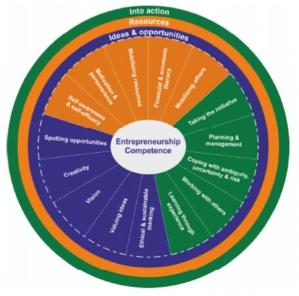Cultivating young entrepreneurs: portugal aligns school curriculum with EU competency goals
FAYETTEVILLE, GA, UNITED STATES, June 16, 2025 /EINPresswire.com/ -- In an era defined by uncertainty and rapid change, equipping students with entrepreneurial skills has become more urgent than ever. A recent critical analysis sheds light on Portugal’s newly implemented national framework for entrepreneurship education (REE), a structured curriculum aiming to foster creativity, resilience, and initiative in school-aged learners.
Despite strong international consensus on the value of entrepreneurship education, its integration into national curricula—particularly at the primary and lower secondary levels—has been fragmented and uneven. Research consistently points to the long-term benefits of nurturing entrepreneurial mindsets, from boosting employability to strengthening civic engagement. However, practical barriers such as inconsistent policy support, inadequate teacher training, and a lack of cohesive instructional frameworks continue to hamper progress. In Portugal, entrepreneurship had historically been the least implemented module under Citizenship Education. Traditional educational models often fall short in promoting interdisciplinary and forward-looking learning. Faced with these obstacles, there is an urgent need for inclusive and adaptable frameworks that can systematically embed entrepreneurial competencies from an early age.
On March 4, 2025, a team of researchers from the Polytechnic Institute of Setúbal, University of Algarve, NOVA University Lisbon, and the Polytechnic Institute of Santarémled by Francisco Banha published (DOI: 10.1007/s41959-025-00135-y) a detailed evaluation of Portugal’s Framework for Entrepreneurship Education (REE) in the journal Entrepreneurship Education. The framework, introduced in 2024 by the Directorate-General for Education, aligns closely with the European EntreComp model and provides a scaffolded, age-specific approach to entrepreneurship education from preschool through secondary school. The study offers a critical review of the framework’s architecture and potential, while also presenting evidence-based recommendations to guide future educational policies and reforms, both in Portugal and internationally.
The Portuguese REE marks a comprehensive national effort to weave entrepreneurial education into the fabric of compulsory schooling. Structured around five core themes—Entrepreneurial Competences, Creativity, Entrepreneurial Action, Surrounding Environment, and Communication—the framework defines specific sub-topics and learning goals appropriate for different educational levels. It leverages EntreComp’s conceptual foundation while promoting critical thinking, ethical decision-making, and hands-on problem-solving. One notable innovation is its emphasis on cross-disciplinary learning, connecting entrepreneurship to STEAM fields and digital skills. Sustainability and social responsibility also feature prominently, although the study identifies room for further development—particularly in introducing entrepreneurial ecosystem concepts and practical tools like risk matrices and design canvases. The authors argue that a clearly defined progression model, based on EntreComp’s Basic-to-Expert levels, is essential for guiding long-term skill development. The framework’s flexibility also makes it suitable for adaptation in diverse educational settings, particularly in Lusophone regions. As the study concludes, the REE represents a timely, strategic response to evolving educational demands in a globally connected world.
“The question is no longer whether we should teach entrepreneurial skills, but how effectively we can deliver them through our education systems,” said Francisco Banha, lead author of the study. “Our work shows that the Portuguese Framework is a strong foundation, but also a call to action. Teachers need support, resources, and assessment tools to implement entrepreneurship education in a meaningful way. With proper investment and continued refinement, this framework has the potential to inspire a generation of students who are not only workforce-ready but also socially and civically empowered.”
Portugal’s REE stands as a transferable model for nations seeking to modernize education in line with 21st-century needs. Its modular yet comprehensive structure enables customization across linguistic, cultural, and institutional contexts—making it especially viable for adoption in Portuguese-speaking countries. By embedding entrepreneurial competencies into the core curriculum, the framework empowers students to engage creatively with their communities and contribute to social and economic innovation. In a world increasingly shaped by digital transformation, environmental challenges, and uncertain job markets, such frameworks are crucial. As entrepreneurship is redefined as a life-wide competence, the REE offers a roadmap for building resilient, adaptable learners ready to shape the future.
References
DOI
10.1007/s41959-025-00135-y
Original Source URL
https://doi.org/10.1007/s41959-025-00135-y
Funding Information
Open access funding provided by FCT|FCCN (b-on).
Lucy Wang
BioDesign Research
email us here
Legal Disclaimer:
EIN Presswire provides this news content "as is" without warranty of any kind. We do not accept any responsibility or liability for the accuracy, content, images, videos, licenses, completeness, legality, or reliability of the information contained in this article. If you have any complaints or copyright issues related to this article, kindly contact the author above.
Visa Integrity Fee Introduced for Nonimmigrant Visa Applicants
IAN LAZAR DIGITAL LIFESTYLE MAGAZINE COMMENCE MONTHLY FEATURES ON AN ARRAY OF MOBILE PHONE RELATED MATTERS
Butera 28 Apartments Blends History and Hospitality: The Hotel-Palazzo-Museum Every Literature Lover Must Visit
Więcej ważnych informacji
 Jedynka Newserii
Jedynka Newserii

 Jedynka Newserii
Jedynka Newserii

Ochrona środowiska

Kraje dotknięte powodzią z 2024 roku z dodatkowym wsparciem finansowym. Europosłowie wzywają do budowy w UE lepszego systemu reagowania na kryzysy
W lipcu Parlament Europejski przyjął wniosek o uruchomienie 280,7 mln euro z Funduszu Solidarności UE na wsparcie sześciu krajów dotkniętych niszczycielskimi powodziami w 2024 roku. Polska otrzyma z tego 76 mln euro, a środki mają zostać przeznaczone na naprawę infrastruktury czy miejsc dziedzictwa kulturowego. Nastroje polskich europosłów związane z funduszem są podzielone m.in. w kwestii tempa unijnej interwencji oraz związanej z nią biurokracji. Ich zdaniem w UE potrzebny jest lepszy system reagowania na sytuacje kryzysowe.
Handel
Nestlé w Polsce podsumowuje wpływ na krajową gospodarkę. Firma wygenerowała 0,6 proc. polskiego PKB [DEPESZA]

Działalność Nestlé w Polsce wsparła utrzymanie 45,2 tys. miejsc pracy i wygenerowała 20,1 mld zł wartości dodanej dla krajowej gospodarki. Firma przyczyniła się do zasilenia budżetu państwa kwotą 1,7 mld zł – wynika z „Raportu Wpływu Nestlé” w Polsce przygotowanego przez PwC na podstawie danych za 2023 rok.
Polityka
M. Kobosko: Surowce dziś rządzą światem i zdecydują o tym, kto wygra w XXI wieku. Zasoby Grenlandii w centrum zainteresowania

Duńska prezydencja w Radzie Unii Europejskiej rozpoczęła się 1 lipca pod hasłem „Silna Europa w zmieniającym się świecie”. Według zapowiedzi ma się ona skupiać m.in. na bezpieczeństwie militarnym i zielonej transformacji. Dla obu tych aspektów istotna jest kwestia niezależności w dostępie do surowców krytycznych. W tym kontekście coraz więcej mówi się o Grenlandii, autonomicznym terytorium zależnym Danii, bogatym w surowce naturalne i pierwiastki ziem rzadkich. Z tego właśnie powodu wyspa znalazła się w polu zainteresowania Donalda Trumpa.
Partner serwisu
Szkolenia

Akademia Newserii
Akademia Newserii to projekt, w ramach którego najlepsi polscy dziennikarze biznesowi, giełdowi oraz lifestylowi, a także szkoleniowcy z wieloletnim doświadczeniem dzielą się swoją wiedzą nt. pracy z mediami.

![Nestlé w Polsce podsumowuje wpływ na krajową gospodarkę. Firma wygenerowała 0,6 proc. polskiego PKB [DEPESZA]](https://www.newseria.pl/files/1097841585/fabryka-nesquik_1,w_85,r_png,_small.png)






.gif)

 |
| |
| |
|